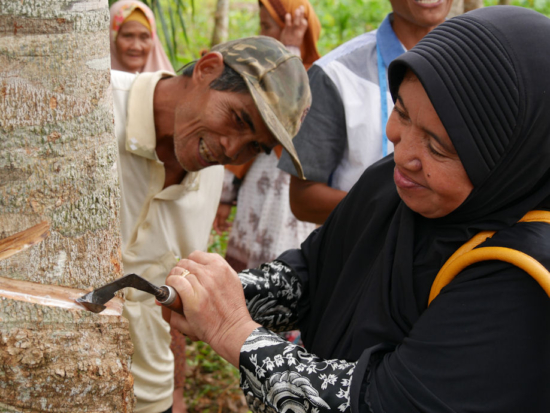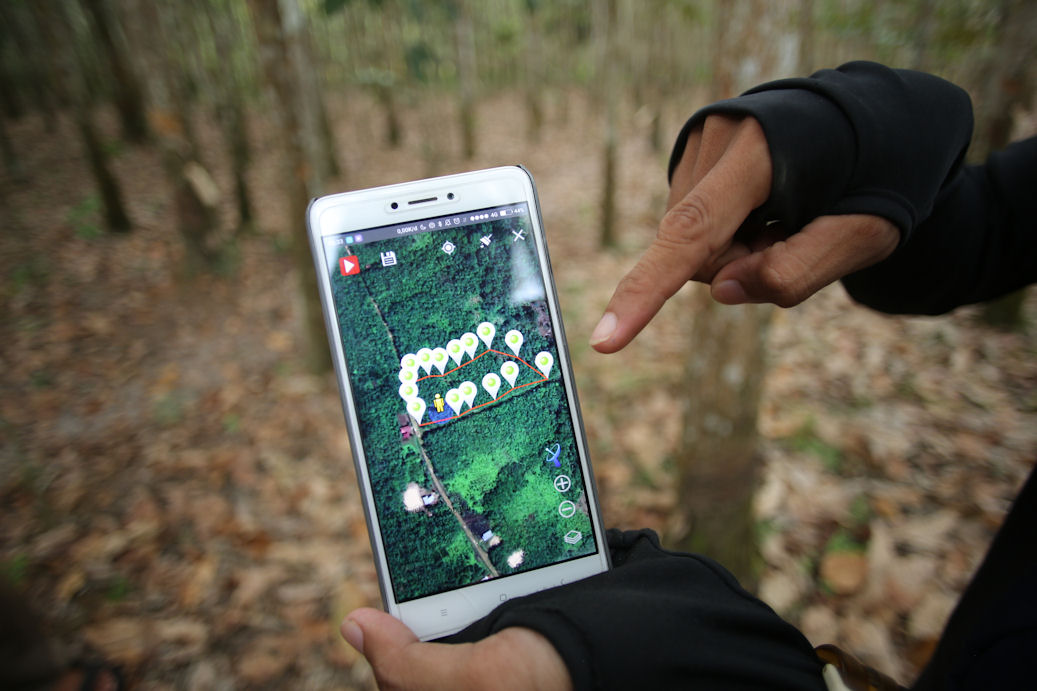Continental “working at full speed” to restructure rubber supply chains
 Continental and GIZ are training smallholders locally in sustainable cultivation practices (Photo: GIZ/Canopy Indonesia)
Continental and GIZ are training smallholders locally in sustainable cultivation practices (Photo: GIZ/Canopy Indonesia)
By weight, natural rubber accounts for between ten and 40 per cent of a modern high-performance tyre, and from 2030 Continental plans to exclusively obtain the natural rubber for its tyres from responsible sources. Claus Petschick, who heads up sustainability at Continental Tire, says confirmation of responsible sourcing is essential to natural rubber’s status as a sustainable raw material, but obtaining this confirmation is something easier said than done as it requires traceability within the supply chain.
Continental explains that completely seamless traceability is currently technically impossible due to high levels of complexity within the supply chain, however it is “working at full speed” on a blueprint for the sustainable and responsible structuring of natural rubber supply chains.
The main tools Continental is utilising to elevate supply chain sustainability are “innovative technology, digitalisation, education projects, and systematic risk mapping.” It has worked with corporate sustainability ratings provider EcoVadis since 2017 to enable a clear assessment of its suppliers’ sustainability performance.
Another cooperation, this time with Michelin and software developer SMAG, focuses on the development of technical solutions for mapping sustainability practices in the natural rubber supply chain and has resulted in the establishment of the Rubberway joint venture for identifying potential risks in the supply chain at an early stage.
Continental considers this joint venture and its concept in line with the goals of the Global Platform for Sustainable Natural Rubber (GPSNR), of which it is a founding member. The tyre maker additionally works with other GPSNR partners – who collectively account for more than 50 per cent of global demand for natural rubber and represent all stages of the value chain – to further increase traceability.
Verifying sustainability
Transparency is also facilitated by examining various points in the natural rubber supply chain. Together with Security Matters (SMX), which specialises in the digitalisation of physical objects in the blockchain, Continental has developed a procedure for invisibly labelling information onto natural rubber. This information can be read and the rubber’s sustainable origin verified using specially developed hardware and software. Continental adds that a separate project looking into marker technology has also yielded successful lab test results.
Anyone wishing to procure natural rubber from responsible sources can view transparent, standardised information on compliance, with social and environmental standards and quality criteria, on the HeveaConnect natural rubber digital trading platform. The platform also provides the option to incorporate information from analyses conducted by Rubberway.
Technology is helping to increase the transparency of supply chains (Photo: GIZ/Canopy Indonesia)
Training in sustainable cultivation
As part of a development partnership with the German development aid agency Deutsche Gesellschaft für Internationale Zusammenarbeit (GIZ), Continental is getting involved right at the start of the supply chain in Indonesia, the world’s second-biggest producer of natural rubber. Production here is mainly carried out by independent smallholders, with more than 2.5 million Indonesian farmers cultivating around 85 per cent of the country’s growing areas.
The remoteness of most farms makes training and advice difficult to access, but Continental and GIZ are working together here to train smallholders in sustainable cultivation practices. This helps farmers to cultivate higher-quality natural rubber, which in turn helps secure the livelihoods of many smallholdings while preventing deforestation. The number of farmers involved will increase from 450 to 4,000 by 2024.
Identifying alternative rubber sources
The Fraunhofer Institute estimates that natural rubber is used in more than 50,000 products. Tyre production accounts for 73 per cent of all use, making the tyre industry by far the largest consumer of natural rubber worldwide. Due to the high global demand for this raw material, Continental is looking for alternate ways of extracting natural rubber.
Together with partners, the tyre manufacturer researches innovative sustainable materials such as natural rubber from dandelions. The central goal of Continental’s Taraxagum project is to end total dependency upon imports of natural rubber from the tropics and to produce this raw material as close as possible to tyre plants in future. This will prevent further deforestation and reduce CO2 emissions reduced thanks to the shorter transportation distances involved.





Comments